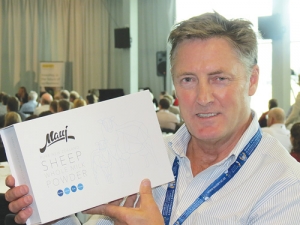Maui Milk achieves grass-fed certification in NZ
Sheep milk processor Maui Milk has achieved grass-fed certification of milk supply against the AsureQuality Grass-Fed Scheme.
 Maui Milk’s Peter Gatley says there’s no way NZ’s fledging sheep milking industry will ever replace the bovine sector.
Maui Milk’s Peter Gatley says there’s no way NZ’s fledging sheep milking industry will ever replace the bovine sector.
Talk of a billion dollar sheep dairy industry is unhelpful, according Maui Milk chief executive Peter Gatley.
Gatley heads the company, a joint venture between the Waitiuhi Kuratau Trust (WKT) on the southwest side of Lake Taupo, and a small group of Chinese marketing and distribution experts. He says while there is room for expansion in the industry it will be done to match market demand.
"I don't see it replacing bovine at all. I certainly don't see the sheep driving all the cows into the sea – no way at all," he told Rural News.
"Take the perspective of the dairy goat co-operative – a great business with great products, a solid base, good distribution, some happy suppliers and a waiting list of farmers keen to be involved. But they have been going for 20-30 years and they are turning over about $180 million. If we could emulate the sort of thing the dairy goat co-operative has done, but do it in 10 years that would be great," Gatley says.
WKT has farmed sheep and beef for many years, but just eight years ago embarked on a sheep dairy operation. While it worked well it lacked good access to market, but this changed when the Chinese business people heard about it.
Since the joint venture was formed, Gatley – whose background is in genetics – has seen a fundamental change in way the business (with 3000 ewes) has been run.
"With the demand for more product we changed the system, which previously had been low input, low output with lambs reared at foot and ewes milked once a day. There was not a huge emphasis on high-energy nutrition, but now we have geared that up, rearing about 2500 lambs directly onto the platform and getting the full benefit of the lactation of the ewes," Gatley explains.
"We have fed the lambs as best we could and milked the ewes twice a day, herd tested them, culled out the bottom end and identified the best ones for breeding."
All the milk produced at WKT goes for processing at Waikato Innovation Park into milkpowder. The reason is that powder is a stable form, easy to handle, doesn't need refrigeration and has a good shelf life, Gatley says.
"It's beautifully packaged and marketed in Shanghai and surrounds and we need quite a bit more just to satisfy demand and to give us some efficiency in our process, as it is very expensive to make powder in small batches."
Agrisea NZ has appointed Craig Hudson as it's new chief growth officer.
State farmer Landcorp, trading as Pamu, is a forecasting a full-year net profit of around $100 million.
Tony Aitken, chief executive of Ruralco, has been awarded the Excellence in Business Leadership Award at the ANZ Business of the Year Awards.
Global trade has been thrown into another bout of uncertainty following the overnight ruling by US Supreme Court, striking down President Donald Trump's decision to impose additional tariffs on trading partners.
Controls on the movement of fruit and vegetables in the Auckland suburb of Mt Roskill have been lifted.
Fonterra farmer shareholders and unit holders are in line for another payment in April.